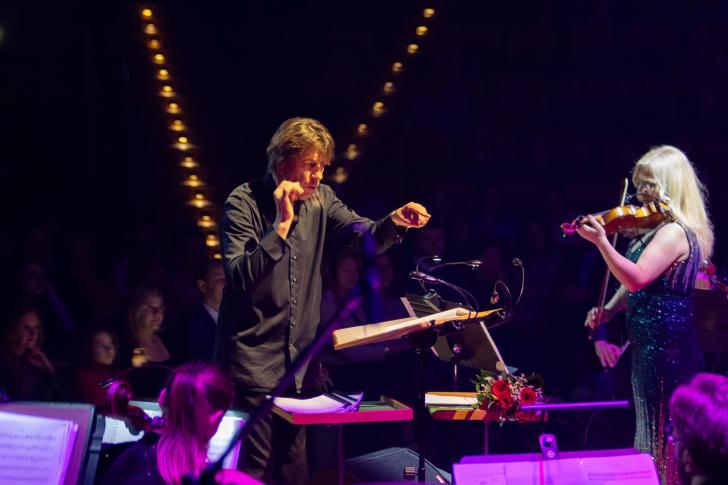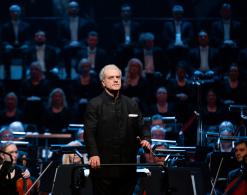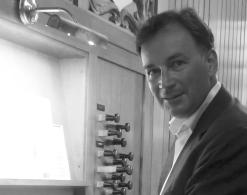Ernst van Tiel: Symphony orchestra is irreplaceable
In between film music concerts in April and November at the Baltic Philharmonic, their conductor, Ernst van Tiel, shared with us his thoughts and observations regarding the musical side of film industry.
Igor Torbicki: Maestro, It’s great to have this conversation with you. For starters, I must admit I’m amazed by your conducting for The Artist soundtrack. And one of the aspects that interests me in what you do is interpretation.
When you're working in a studio on a movie soundtrack, you get the score from the composer with all the markings, tempi and so on, probably with a simulation. So you have very detailed information about what to do. Given that, how much freedom do you have when you’re recording a movie score?
Ernst van Tiel: That’s an interesting question. I discovered, especially with The Artist, but already before, that the more freedom I take, the more the composers like it. Also, many composers don't think about expression or special effects. They just write notes where they need them in the score. And when I add something to it, they love it. So usually I have a lot of freedom.
You conducted a lot of film scores, and you most certainly have a lot of insight into the film industry. That’s why I have a very broad question regarding the general trajectory of film score evolution.
We are most certainly past the era of pure symphonic orchestral soundtracks. There are figures like John Williams and so on, but the times of fully symphonic, neoromantic aesthetics in cinema, which for me was embodied by Max Steiner, seems to be almost over. Where is the film industry now in this regard?
Well, of course there are more and more possibilities with the use of electronics. But personally, I'm very happy that still, until now, they use normal orchestras, if they have the money. The space, breathing of traditional symphony orchestra still cannot be fully imitated on synthesisers.
And I can tell you this: before I make a recording of film music, composers always send me electronic samples. And those samples are taken from the best orchestras in the world. You can choose the strings of the Vienna Philharmonic and the brass of the Berlin Philharmonic. But even then, the atmosphere of the real orchestra is still missing.
The film music industry is very big. There are talented composers, but there are also many composers who imitate others. I will give you an example. I like Hans Zimmer very much. But because of his success, studios are sometimes asking new, young composers to write music in his style. I don’t like that so much. Hans Zimmer is interesting, copies of Hans Zimmer are not.
I also think that John Williams still has a big influence on young composers. He works with so many orchestral colours! Besides that, he’s very experienced in working with symphony orchestras. He’s done that for more than 60 years now.
And sometimes he still conducts them by himself.
Yes. He is a conductor who works with Boston Pops longer than anyone else. And It's not easy to work on the popular classical music. He's very, very experienced.
Film music industry, in a way, is similar to the world of classical music. In the time of Mozart, or Tchaikovsky, there were many composers on a high level, but just a few on a very high level. And we mostly remember the latter. In music for films it’s the same. There are composers working with big symphony orchestras that are fantastic, but unknown. One of them is Elliot Goldenthal, who wrote music for some of the Batman films. Another example is Michael Giacchino. I know all those people personally, we did concerts together. They are really talented and inspiring for young composers.
What we have to face as a problem is how to bring the symphonic art into the future. I’m talking about film and classical music alike. Who will come and listen to Tchaikovsky, Prokofiev or Brahms in 10 or 20 years? We have to think about this. Young people… and not only young people, everybody is more and more interested in art involving visual content. That’s why cineconcerts are getting popular. Another reason is that many people discovered that film music is also a kind of theatre music. It’s supporting the action and characters, giving exposition and so on. So you have opera, ballet and film. There's also theatre, and I'm sure that if Richard Wagner would have lived now, he would have written for film.
Do you think that making a cineconcert revolving around a very modern film with big soundtrack, like Dune, for example, is possible?
There are many things that are important. First of all, it has to be a very good film, and its music has to be brilliant and playable in its entirety. Some studios make too complicated scores to be played live. Another factor is that there should be enough music in the movie. You cannot put 80 people on stage and make them wait for 20 minutes, then play for 4 minutes, wait another 10, et cetera.
One of the films which I like the most, but will not conduct a cineconcert with, is The Godfather. There is not enough music in it. Of course, there are some famous tunes that we’d play two or three times. But there has to be a reason to put so many people on stage. Development is also important. Prokofiev was one of the first classical composers who wrote for films.
In this case, the Eisenstein films.
Yes. He did it also on in a really classical way. Exposition in the beginning, accompaniment for the story, themes for characters. The further we watch films with his music, the more it’s present in them. Towards the end it’s less dialogues and more music.
And Stravinsky was one of the composers who never wrote for film. He wanted to, though. He even moved to Los Angeles to do it, but he was never able to make a deal with a film studio. Korngold, after moving out of Europe, became very important for composers after him. He was very well educated, especially in harmony. Won a few Oscars. Bernard Hermann was important, too, just like Korngold.
Because of music for Taxi Driver?
Not only. He was the main composer for Hitchcock. He wrote music for Psycho using string orchestra… And Vertigo, one of the most beautiful film scores ever.
I remember listening Korngold’s Sinfonietta here, in the Baltic Philharmonic. It gave me a cinematic feeling, although it wasn’t film music.
He quoted his own film scores in Violin concerto, wrote music for Robin Hood… Terrific composer.
Are there any classical music pieces that, in your opinion, have cinematic narrative? For me, a perfect example of that are some of Shostakovich’s late symphonies, like 11th and 12th. They’re almost like film score without film.
Many opera scores are like that. But among symphonic pieces, Dvorak’s 9th, From the New World, makes me almost see what’s written there. There is also a lot of music that was not written for film, but can be used with it effectively.
Penderecki’s Utrenja in The Shining…
Or Samuel Barber’s Adagio for Strings in Platoon. It’s just as if it was written for it. When I was a child, together with some friends I played some music for an old film about nature. At some point, we decided to change the music. And nature in the film has changed for us, too. Music influences perception a lot.
Has conducting movie scores changed anything in your perception of classical works?
No. More the other way around. I feel appreciated by orchestras when I conduct film scores the same, serious way that I do with classical music. In the past, opera was highly respected. Ballet – a little bit less. But film music – much less. The general approach was that after just one rehearsal you could conduct a film music concert. But people discovered that when you take it very seriously, the whole atmosphere and final result is much better.
Last question, maybe a bit trivial. You worked with Hans Zimmer personally. How was it?
Very simple answer: it was easy. He is a person who knows exactly what he wants, but is also open to new ideas. He respects musicians and orchestras. We worked a few times and had a great time together. Even if I did something differently than he wanted, he appreciated it.
There’s a general lesson in this. My conducting teacher told me once that if you go to an orchestra rehearsal with a clear idea of, let’s say, oboe solo in your head, and the oboist starts to play better than your idea, you should thank him and let him be free. Life can be as easy as this.
Thank you very much for this conversation, Maestro.
Thank you.





